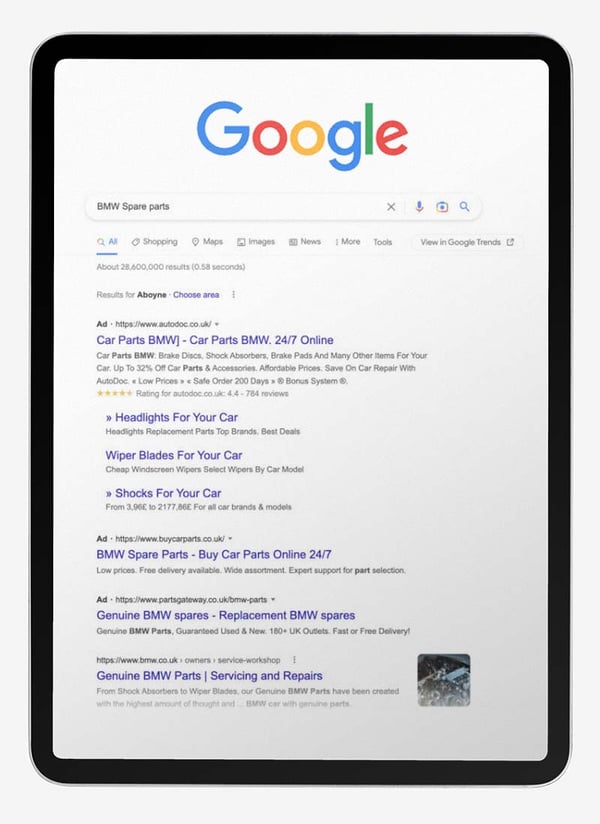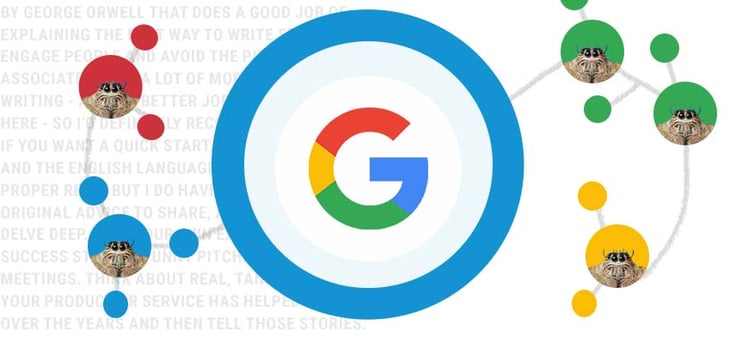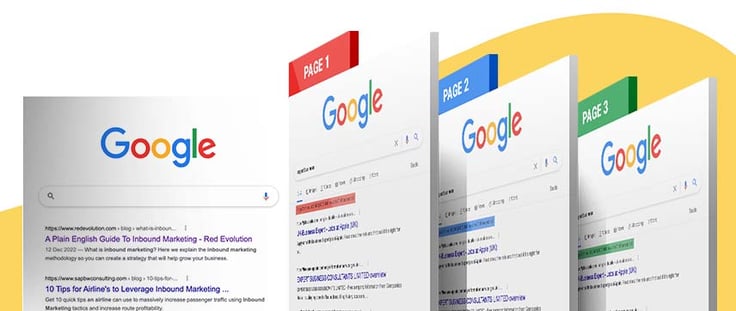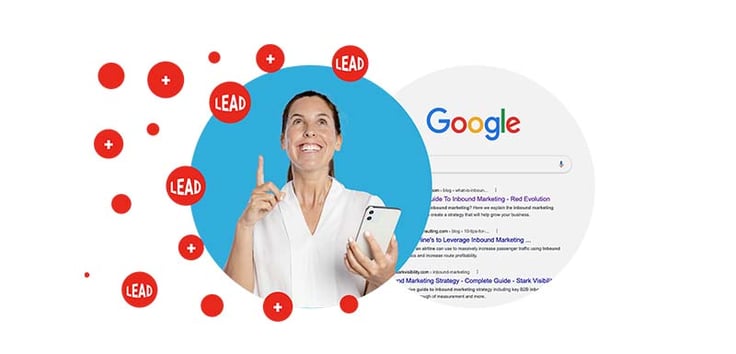SEO for SME's is no different to any other type of search marketing other than SME's are often unable to assign enough budget to the work. This means developing an understanding of SEO is important. We have got a track record of explaining SEO using simple, non-technical language; we've even created a comic strip where our super-hero SEO Man outlines the basics of SEO. With this post, I will put all that advice into the context of small and medium-sized or SME business owners. So if you're a business owner, this one is for you.

How Google Works
It's fair to say Google works in mysterious ways, and with good reason. If they were transparent about how they rank web pages, they'd be fair game for every scammer and wannabe internet superstar out there. Effectively Google would become useless because people wouldn't trust the rankings.
That said, all Google is trying to do is provide links to information, web pages, videos, and so on that help people looking for solutions to, for example, business challenges. Just like when you search in Google when you're trying to solve a problem or make a purchasing decision. For example, if you were looking for an SEO agency and you lived in Edinburgh, you might search using the term SEO Edinburgh. Incidentally, here's some advice about finding a good SEO expert.
Google do a great job of this, and it's definitely the case that people trust search results, normal organic search results. Less so the adverts.
Google Adverts v Organic Search Results
Anecdotally, people don't trust businesses that use Google's paid search system, Google Ads. I've lost count of the number of times I've heard someone say, "I never click those adverts". Google's share price indicates otherwise, as this is probably their main source of income.
This implies people, for the most part, believe the websites that appear top in the natural search results are the "best", so it's important to be there as a business. However, Google has tweaked the design of their search results pages so much that many people can no longer distinguish between natural listings and paid ones!
This means that in some cases, hard-earned organic search results will lose out to the adverts that sit above them on a typical search results page. Here's an example with only ONE organic result above the fold or visible without scrolling, and even then, it was because I was zoomed out; without that, no organic results would show. So even if you don't trust paid search results, it's worth investigating Pay Per Click or PPC in tandem with SEO.

All that said, we do have a good idea of how search engines work, so as a business owner, knowing how to make sure your web pages stand the best possible chance of appearing in the search results is vital, and that's what's being explained in this article.
The Crawl
So, Google's software looks at web pages 24/7 using automated tools or software agents. These software agents are often called spiders, and commonly people talk about them crawling the web looking for pages. The spiders gather information which is then passed to Google for indexing. You can think of indexing as a way of storing information so it can be accessed quickly. So, it's saved in a way that makes it quick and easy to find, and it's called an index, just like the index of a book directs you to a specific page.
If Spiders Were People
If Google's spiders were people, they would sit clicking links on web pages, gathering information, which they would then pass to a librarian who would later store it for easy access. Instead of going to Google, you would then call the librarian, tell them what you're looking for, and they would give you some websites to visit based on the information their human spider substitutes had gathered.

You can get information about how Google "sees" your website using the Google Search Console, a fantastic free resource that every website owner should be aware of.
The search console will tell you, for example, how much of your website Google can see, which bits have been crawled, and which pages are shown in search results. It's a gold mine of information for anyone serious about generating more business from their website.
How Google Chooses The Pages To Display In Search Results
You now know that the information the spiders gather is indexed in a way that makes it easy to retrieve, but it also needs to be ordered, and this is where it all gets controversial and complicated.

How Google Automates the Ordering Of Chaos
As a business owner, you're really only interested in how Google decides which pages to show when someone searches. Specifically, you want to know how to ensure your pages appear. This is where it all gets both interesting and confusing, and it's why so many people ply their dishonest trade claiming to have some secret sauce that can trick the search giant into ranking pages higher than they should be.
If your web pages contain the search terms people are using, you can appear in the search results. But, if hundreds or thousands or even millions of other pages also contain these search terms, it all starts to get much harder.
How To Increase Your Chances of Search Success
There are things you really have to do to increase your chances of showing up in search results, leading to more visitors to your website and more enquiries. Instead of just thinking SEO, think Digital Marketing and take a broad view, starting from your customers' point of view:
- Understand what your customers are searching for. This is known as keyword research, and it's all about understanding the problems your ideal customers are trying to solve. As an SME owner, you should know this; after all, it's probably why you started the business.
- Create genuinely useful content. This should obviously be content that uses the keywords you know your customers are typing into Google, the words your keyword research found.
- Create fantastic, highly optimised web pages. This doesn't mean your content should be written for search engines, far from it, but it should be formatted and presented in a way that makes it easy for them to crawl and index it.
- Share your content with people who care. If your content is genuinely fantastic, there's a good chance it will have a ready audience. By linking to your content, these people can potentially give it the authority it needs. More on this later.
 The above is in contrast to what most SME business owners actually do. They commonly create web pages claiming to be the best, fastest or cheapest supplier of whatever goods or services they offer. Content like that doesn't help people, it simply tries to sell to them, and people are sick of being sold to; 21st-century buyers expect more.
The above is in contrast to what most SME business owners actually do. They commonly create web pages claiming to be the best, fastest or cheapest supplier of whatever goods or services they offer. Content like that doesn't help people, it simply tries to sell to them, and people are sick of being sold to; 21st-century buyers expect more.
Today, purchasing decisions start with research. Buyers educate themselves, and by the time they are ready to buy, they know exactly what they want, more or less. If you're not helping them at the research stage, you're missing out, big time.
It's All About Being Useful and Popular
As we've said many times, your website should be about helping people, you know, those people researching advice before making a buying decision. If you're unsure what that looks like, it looks like this. No, that's not a link; when I say this, I mean this blog post you're reading now. We create blog posts to share our thoughts, ideas and expertise in the hope some people find it useful and contact us when they're ready to buy, and they do.
But there's another way useful content helps; I alluded to it earlier.
Links Means Prizes
If your site's got great content on it, content people might get excited about; they might link to it from their content. This matters because links to your site from other sites are what Google uses to rank pages. They are like votes, but getting them is hard.
One way to go about link building is to share your fantastic content on your social media accounts. This way, it might get picked up by others who'll link to you from their blogs or web pages. It takes time, and it's a slog, but it's what you need to improve your rankings.
There's more about link building in this article.
One word of warning about link building. Google is constantly trying to determine which links have been earned and which ones have been bought. Some argue they are fighting a losing battle - usually those selling links. Others, like us, believe Google is getting better at spotting cheats. In fact, they need to get better at it to survive.
So tread carefully of you decide to buy your popularity.

Build a Site That Deserves to Rank
Like most businesses, SEO for SMEs is ultimately about building a site that deserves to rank. If you do that, you will have a powerful lead-generation machine that will feed your sales pipeline with opportunities. If you spend your time listening to people who claim to know how to trick Google, you might succeed, but to be honest, my money's on them.

If your website's not generating new business opportunities, let's talk.

